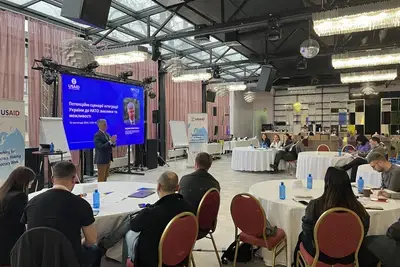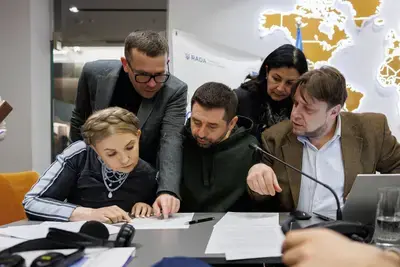
Success Story
NDI: Buttressing Ukraine’s Sovereignty Since Independence
In December 1991, 92% of Ukrainians voted for independence from the former Soviet Union, with a voter turnout of 84%. While Moscow saw Ukraine and other former Soviet States as remaining under its sphere of influence, from the outset Ukraine’s people embraced democracy and its government generally oriented itself toward the West rather than Moscow. Those differing aspirations between Ukrainians and Russians led directly to Russia’s unjustified 2014 attack and occupation of eastern Ukraine, its illegal annexation of Crimea, and its unprovoked full-scale invasion in 2022 - all of which have been met by Ukrainian resistance.
As Ukrainians set out in 1992 to build state structures based on democratic precepts, and a civil society to foster them, NDI provided assistance. Encouraged by then-NDI Vice Chair Madeleine Albright to help Ukraine democratize, Sarah Farnsworth, a U.S. political campaigner, was soon on the ground meeting with Ukrainian activists and political parties about the fundamentals of democratic politics.
“NDI’s office was my kitchen table,” Sarah remembers. Her Kyiv apartment became NDI’s first office in Eurasia. She brought on Oksana Shysh as NDI’s first Ukrainian administrative staff member, who continues to this day to skillfully manage NDI’s in-country office. Oksana and her family over the years have also served on the frontlines of Ukrainian democracy in other ways, materially supporting the 2004 Orange Revolution and the 2014 Revolution of Dignity. Today her son serves in Ukraine’s military to fight Russian invaders.
NDI’s early efforts blossomed into work across a spectrum of democratically oriented political parties at local and national levels and included reformers who were mayors, counselors and members of parliament. Sarah identified three keys to building initial relationships: those coming to the country must have willingness to learn from Ukrainians; patience was required because dealing with 70 years of communism complicated reform; and focusing on practical things that build public confidence was needed. Working alongside the International Republican Institute (IRI) also demonstrated to Ukrainians that coalition building was possible as NDI and IRI representatives periodically met together with party activists.
To support unfolding political party, legislative and related governance programming, NDI brought in six-person groups of multinational experts. After a week of briefings by Ukrainian staff and partners, the teams split up and traveled across the country for several weeks each, ensuring that all regions were covered. This initiative enhanced NDI’s knowledge of the country, fostered new relationships with local partners and helped Ukrainian counterparts enhance their skills and build their networks. NDI was thus able to develop relationships across Ukraine’s political spectrum, establishing a reputation for being an honest broker for the years to come.
Veteran Washington, DC, political organizer Ted Gay and former Canadian Member of Parliament and Minister of Fisheries and Oceans Ross Reid were among NDI’s stalwarts in early political and legislative assistance efforts. NDI also brought in opinion pollsters from the Czech Republic to help university faculties and political parties build capacities to generate and analyze relevant political data. A significant consequence of that effort was the establishment of a Ukrainian polling firm “Democratic Initiatives”. The company’s research and reports continue to play an important role in measuring the temperature of the Ukrainian public at critical political junctures.
Civil society was also a priority for NDI’s early efforts in Ukraine. Activities included a variety of forums that reached hundreds of people across the country. Canadian activist and academic Marta Baziuk, who was NDI’s lead representative with civil society, particularly recalls working with “young people with spark” who in 1994 built Ukraine’s first national civic network the Non-Partisan Committee of Voters (later called the Committee of Voters of Ukraine or CVU). Formed by a consortium of 16 organizations, including student groups, a human rights organization and a labor union, CVU is continuing its work almost 30 years later. Three of its initial leaders are now members of Ukraine’s parliament and another served on the Central Election Commission.
As part of its early election monitoring efforts, CVU gained a legislative change that granted observers access to polling stations. Its committed activists analyzed train schedules to ensure that observer materials could be delivered, organized telephone trees for calling in observer reports, and employed statistical methodologies to verify election results. As Marta says: “It was humbling to witness the determination of Ukrainian activists driven because people wanted hope - something that drives the country today.”
NDI’s aid to citizen election monitoring and related advocacy later included Ukraine’s Civil Network OPORA (“Support”). The organization was founded by students and other activists following the 2004 Orange Revolution to promote governmental transparency, accountability and electoral integrity. In the 19 years since its founding, OPORA not only has built a strong national network for monitoring and advocacy, but also entered coalitions with other groups, influenced legislation, and built bridges with governing institutions to affect democratic change. Today it is focusing on humanitarian needs as well as Ukraine’s continued democratic development post-invasion.
While visiting Washington in March 2023, the head of OPORA’s Board Olga Aivazovska noted that OPORA and NDI have developed “a real partnership of two equal organizations with different capacities and the same values, which help each other,” and highlighted the importance of such ongoing international solidarity.
The Ukraine program is NDI’s largest. It is also one of the Institute’s most diverse, encompassing political party, parliamentary, civic organization, gender, youth LGBTQI+, local governance and information integrity support. NDI's January 2023 nationwide poll showed that a resounding 94% of Ukrainians want their country to be a “fully functioning democracy”. That includes 95% in the south and 92% in the east of the country; 86% favor Ukraine being part of NATO, and 92% favor joining the European Union.
Ukrainians clearly know what they are fighting for, and democratic activists around the globe are inspired by their courage, determination and resilience. NDI is committed to standing solidly with them in the years ahead as we have for the past three-plus decades.



